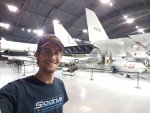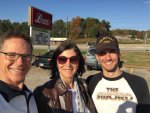I worked at LAX in the mid-80's. I worked as a ramp agent crew lead for Butler Aviation, having transferred from DFW. It was a rough schedule though because at LAX, Butler only had one contract, Alitalia Airlines. Alitalia flew a 747 Combi - the main deck was passenger for about the front 2/3 and the rear 1/3 was freight. Had a big freight door in the side and could take 5 pallets (M-6 IIRC, but might have been M-4
http://www.boeing.com/resources/boeingdotcom/company/about_bca/pdf/CargoPalletsContainers.pdf ). It had to be loaded/unloaded using both an upper deck loader on the port side as well as the normal lower deck loaders on the starboard side. Being the crew lead, I was the guy who had to operate the main deck loader.
We would load it in the morning and Alitalia would fly it west to east from L.A. to Rome, making several stops along the way. In Rome they would turn it around and send it back. At LAX we would unload it while the cleaning crew cleaned it, park it and shut it down for the night. Next morning we'd open it up, tow it to the terminal and start loading it.
The ramp crew had a high turnover because we had to work what was called a "split shift"; 7am-11am and 7pm-11pm.
I lived more than an hour's drive in L.A. traffic from LAX, so I had bought a camper to put on my 1979 Ford F-250, and since Butler had a whole hangar for our operation and hardly used 1/4 of it, we always parked in the hangar instead of in the parking lot. I had my supervisor's permission to plug in my camper to shore power, and he had even given me a key to a huge shower/locker room that was in the hanger but no one used. So I basically lived in my camper in the hangar instead of going home and back between shifts.
One day in the employee cafeteria, I noticed on the bulletin board a posting that Allied Aviation was hiring fuelers for a 12pm-6pm shift. I figured they probably wouldn't get a lot of interest in a short shift, but it fit perfectly with my schedule at Butler, so I took a shot and applied. I was rather surprised when I got a call from a secretary saying that the station manager (the big boss of an airport FBO) wanted to see me.
So I went there at noon the next day to meet him, and he was very cordial. He told me that he definitely wanted me for the job, but I was not a certified fueler, and Allied doesn't do training at LAX. The nearest Allied FBO with training was at SFO. I told him I couldn't take off from my job at Butler to do it, and he said he realized that, but he had an idea. He then asked me if I knew a guy named so and so at Butler DFW. I said yes, he was one of my supervisors. He said well he had grown up in Grapevine (northern Dallas), and that guy was his neighbor. They had been best friends since grade school. When he saw my application, he called his buddy at Butler who told him I was the best they had and they were grooming me to be a supervisor when I decided to transfer to LAX, and they were very sorry to see me go. His buddy told him that he should absolutely hire me.
So the station manager's idea was this; training at Allied was 2 weeks of classroom instruction, followed by the written exams (FAA, Fire Department and company). Then upon passing the exams, 3 weeks of on the job training, then finally certification. He proposed to have Allied SFO put the training materials in a box and stick them on a plane to LAX. He would then pay me for two weeks 12-6 to sit in a room and study. He had no one available to help me, I would have to learn the material on my own. If I passed, then he'd put me on permanently and start the OTJ training. His buddy at DFW was confident I could do it, but was I? I said absolutely, so that's what we did. I aced the exams.

So then 3 weeks OTJ training, where I was basically not allowed to touch anything without a supervisor watching over me. Which I passed, no problem, and became a certified fueler.
Now, at this time Ronald Reagan was President, and spent a lot of time in California, so Air Force One - the 707 - was very often parked in front of a remote hanger way down at the end of LAX.
So I come into work the day after getting certified. It's my first day to solo. I get to the line shack that we worked out of and there's no one there. Very unusual. I grab a radio and call the supervisor to report that I'm on the clock and ready to go...and where is everybody. Well, when fueling, there is an air-powered "deadman" valve (similar to the handle on a gas pump nozzle) that you have to hold continuously while fueling the aircraft. Unlike a gas pump nozzle though, it doesn't have any provision to lock it open - you have to hold it the whole time. And fueling a 747 can take an hour and a half. Anyway, there was this one guy who was known to break off a pencil and stick it in the deadman and then doze off. He'd been busted for it several times. So he'd done that, had not woken up in time, overfilled the tanks which spilled through the wingtip overlfow ports onto the ramp. The rule was, if the spill was less than X (can't recall the exact number offhand) gallons, you didn't have to call the Fire Dept. But this time the joker had spilled like 50 gallons on the ramp. So all hands were out there spreading cat sand and cleaning it up while the Fire Dept. stood watch over the whole show...and the flight was delayed, which is a cardinal sin in airline operations.
So I asked if I should come out there and help clean up. He said no, they had it handled. I should just wait in the line shack and answer the phone. Okay, I can do that. Well a few minutes later, the phone rings and it's "Pad (number redacted for security)". That was the code word for Air Force One. We never called it Air Force One over the radio or on the phone, it was always "Pad XX". And Pad XX never scheduled things ahead of time. They would call when they wanted something. So it's Pad XX and they need 6,000 gallons of Jet A. I said okay when, and was told, now. So I said, okay, we're on it.
So I called the supervisor on the radio and told him, and he said, okay, handle it...
To which I replied, um...you do realize this is my first day solo right? And this is Pad XX we're talking about? And I've never actually fueled a 707? To which he replied, are you a certified fueler or not? I said yes, I am. He said fine, handle it. So I said, okay, I'm on it.
Now we used three sort of trucks. One was just a metering and filtering device that didn't have a tank. It would hook up to a grid of fuel distribution lines in the ground and transfer from the distribution system through the apparatus on the truck and into the plane. That was called a Hydrant Cart and was pretty much all we used at the terminals.
Then we had 8,500 gallon and 10,000 gallon tankers. The 10,000g tankers had dual steering axles and a manlift on the front.
Pad XX didn't have a fuel port (what we called a pit) in the ground, so I'd have to use a tanker. When I went outside to look, there were no 8,500's there, only a couple of 10,000's, so I grabbed one and checked it out. It had less than 2,000 gallons in it, so I'd have to head over to the tank farm and fill it up. We were not allowed to partially fill a tanker. The rule was, if you took it to the tank farm, you filled it all the way. So I filled it up and headed for Pad XX.
(continued in next post)























































